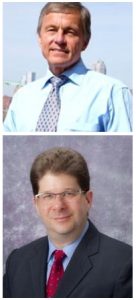
Sponsored by the Pittsburgh Business Times, the 2018 Health Care Hero Awards honor the individuals, companies, and organizations in western Pennsylvania for their contributions to improving health care in our region.
This year, McGowan Institute for Regenerative Medicine Deputy Director Stephen Badylak, DVM, PhD, MD, Professor in the Departments of Surgery and Bioengineering, and Director of the Center for Pre-Clinical Tissue Engineering within the McGowan Institute, and J. Peter Rubin, MD, Chair of the Department of Plastic Surgery, UPMC Endowed Professor of Plastic Surgery, and Professor of Bioengineering at the University of Pittsburgh, Co-Director of the Adipose Stem Cell Center, and Founder and Director of the Center for Innovation in Restorative Medicine in the Department of Surgery at the University of Pittsburgh, together will receive a distinguished Health Care Hero Award in the Health Care Innovation category.
Drs. Badylak and Rubin have revolutionized the care for individuals who have experienced severe volumetric loss of muscle tissue in the extremities (arms and legs) due to traumatic events such as a bomb or a car accident. An example of how this innovative therapy has restored a young soldier to full health and functionality after being injured in combat follows:
Sergeant Ronald Strang survived an IED blast in Afghanistan that shredded muscle from his left leg. After 18 months and 14 surgeries, his movement was still very limited. So, he entered a study led by Drs. Badylak and Rubin that utilized a new approach to rebuild lost muscle. Prior to the application of the experimental procedure, Sergeant Strang’s quadricep had lost 68 percent of muscle tissue. Sergeant Strang then underwent a groundbreaking surgery that used tissue scaffolding created from a pig’s bladder to spur new muscle growth. The outcome was remarkable—prior to the surgery using his injured leg, Sergeant Strang could only hop forward about one inch; six months later, he was asked to jump again, using only his wounded left leg. This time, he was able to leap 24 inches!
Sergeant Strang was one of thirteen patients who took part in this study, supported with funds from the U.S. Department of Defense and conducted by the McGowan Institute for Regenerative Medicine.
For the study, the researchers used an extracellular matrix (ECM) scaffold that is created by removing all of the cells from a pig’s bladder. This decellularized scaffold is implanted in the body, and the scaffold receives cells from the patient to form new tissue. This scaffold methodology was the core technology that permitted the miraculous recovery of these 13 test subjects.
Dr. Badylak has been researching the effects of ECM since 1987. He began by using tissue that contained cells but soon discovered that it was the cell-less ECMs that promoted recovery. It appears that the removal of cells limits complications such as the rejection of foreign cells as well as the development of infection. Dr. Rubin developed the ECM implant procedure.
This was the first study ever to regenerate muscle in humans by applying ECMs, although researchers have previously used ECMs to repair other body parts such as hernias and esophageal lining. The scientific principles are the same, no matter the body part. These cell-free scaffolds look like a translucent sheet. When placed in a patient’s body, they recruit the patient’s own stem cells and alter the function of “inflammatory” cells so that they all aid in the regeneration of healthy tissue.
In each of the study’s thirteen surgeries, scar tissue from the damaged leg muscles was removed, and the ECMs were placed next to nearby healthy muscle. Within months, mature skeletal muscle cells emerged at the site of the ECM placement, along with other cells that appeared to be actively regenerating into skeletal muscle cells. The ECMs, meanwhile, did their job and eventually dissolved altogether, leaving only healthy muscle.
The results didn’t only show dramatic improvement on physical tests. Sergeant Strang and the other participants are now engaging in a range of activities including running, bicycling, playing soccer, and even skiing—exercises they couldn’t have enjoyed before their surgery.
The Department of Defense is working to make this innovative therapy across the entire military health system, and civilians are being helped by this new procedure. Drs. Badylak and Rubin’s innovation has helped many in need, and their creativity will undoubtedly help thousands in need in the future…both military and civilian. Based on their innovation, creativity, and productivity they are health care heroes.
Other winners with UPMC/Pitt affiliation include:
Health Care Innovation–
Lanie Francis, MD, UPMC Hillman Cancer Center
Scott Lammie, UPMC Insurance Services Division
Health Care Executive–
Diane Hupp, Children’s Hospital of Pittsburgh of UPMC
Steven Reis, MD, University of Pittsburgh Clinical and Translational Science Institute
Winners and finalists will be honored at an annual awards event at the Fairmont Pittsburgh on September 13, 2018.
Congratulations to all!
Read more…
Pittsburgh Business Times: Winners Drs. Steven Badylak and J. Peter Rubin
